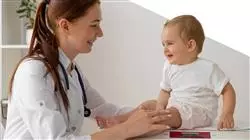University certificate
The world's largest faculty of medicine”
Introduction to the Program
Update your theoretical knowledge and practical skills for the management of pediatric diseases in Primary Care through the two academic phases that make up this blended Master"

At present, Pediatrics in Primary Care has several clinical, therapeutic and technological resources to address respiratory, cardiac and neurological diseases, among others. Thus, novel strategies have appeared for the management of asthma or bronchitis through inhalation therapies, as well as the use of minimally invasive surgical techniques to avoid large scars in cardiovascular interventions. Likewise, new pharmacological trends have emerged for the approach to epilepsy, among many other care variants for the care of children and adolescents with neuropathies. At the same time, it is difficult for specialists to keep up to date with all these advances due, among other reasons, to the lack of pedagogical programs that analyze all aspects of this medical area.
For this reason, TECH has designed this educational modality, a pioneer in its type, which integrates the most recent theoretical and practical knowledge regarding Pediatrics in Primary Care in two fundamental stages. In the first of these academic moments, the physician will dedicate 1,500 hours to the study of new concepts and new care strategies, in a 100% online and interactive platform. In addition, the program is supported by innovative teaching methodologies, such as Relearning, and multimedia resources, such as videos and infographics.
Upon completion of this theoretical phase, the specialist will be transferred to a prestigious hospital. In this program, they will carry out an intensive, on-site stay of 3 weeks' duration, distributed in days from Monday to Friday, for 8 consecutive hours. In these centers, the physician will have at his disposal technological tools and will apply novel procedures for the care of real patients with different pathologies. You will also work with leading experts and learn firsthand about their most outstanding experiences. At the same time, you will have an assistant tutor who, throughout the clinical practice, will allow you to assimilate the most modern care dynamics and incorporate them into your daily practice.
You will examine in depth the academic modules of this study plan and add to your wealth of skills the latest scientific evidence about the management of Primary Care Pediatrics”
This Hybrid professional master’s degree in Primary Care Pediatrics contains the most complete and up-to-date scientific program on the market. The most important features include:
- Development of more than 100 clinical cases presented by Primary Care Pediatrics professionals
- The graphic, schematic, and practical contents with which they are created, provide scientific and practical information on the disciplines that are essential for professional practice
- Comprehensive systematized action plans for the main pathologies In Pediatrics in Primary Care
- Presentation of practical workshops on diagnostic and therapeutic techniques in the Emergencies ill patient
- An algorithm-based interactive learning system for decision-making in the clinical situations presented throughout the course
- Practical clinical guides on approaching different pathologies
- All of this will be complemented by theoretical lessons, questions to the expert, debate forums on controversial topics, and individual reflection assignments
- Content that is accessible from any fixed or portable device with an Internet connection
- In addition, you will be able to carry out a clinical internship in one of the best hospitals in the world
You will examine the academic modules of this curriculum in depth and add to your pool of competencies the latest scientific evidence about the management of Primary Care Pediatrics"
In this Hybrid professional master’s degree proposal, of a professionalizing nature and blended learning modality, the program is aimed at updating professionals in Genomic Precision Pneumology who require a high level of qualification. The contents are based on the latest scientific evidence, and oriented in a didactic way to integrate theoretical knowledge into medical practice, and the theoretical-practical elements will facilitate the updating of knowledge and will allow decision making in patient management.
Thanks to their multimedia content developed with the latest educational technology, they will allow the Healthcare professional to obtain situated and contextual learning, that is, a simulated environment that will provide immersive learning programmed to train in real situations. This program is designed around Problem-Based Learning, whereby the professional must try to solve the different professional practice situations that arise throughout the program. For this purpose, students will be assisted by an innovative interactive video system created by renowned and experienced experts.
Throughout this Hybrid professional master’s degree, you will acquire a broad mastery of the most important theoretical concepts to be taken into account in the approach to respiratory pathologies in children and adolescents"

Complete your training with a clinical stay of the utmost rigor, under the close supervision of an associate tutor with a long professional career in the pediatric discipline"
Why study at TECH?
TECH is the world’s largest online university. With an impressive catalog of more than 14,000 university programs available in 11 languages, it is positioned as a leader in employability, with a 99% job placement rate. In addition, it relies on an enormous faculty of more than 6,000 professors of the highest international renown.

Study at the world's largest online university and guarantee your professional success. The future starts at TECH”
The world’s best online university according to FORBES
The prestigious Forbes magazine, specialized in business and finance, has highlighted TECH as “the world's best online university” This is what they have recently stated in an article in their digital edition in which they echo the success story of this institution, “thanks to the academic offer it provides, the selection of its teaching staff, and an innovative learning method aimed at educating the professionals of the future”
A revolutionary study method, a cutting-edge faculty and a practical focus: the key to TECH's success.
The most complete study plans on the university scene
TECH offers the most complete study plans on the university scene, with syllabuses that cover fundamental concepts and, at the same time, the main scientific advances in their specific scientific areas. In addition, these programs are continuously being updated to guarantee students the academic vanguard and the most in-demand professional skills. In this way, the university's qualifications provide its graduates with a significant advantage to propel their careers to success.
TECH offers the most comprehensive and intensive study plans on the current university scene.
A world-class teaching staff
TECH's teaching staff is made up of more than 6,000 professors with the highest international recognition. Professors, researchers and top executives of multinational companies, including Isaiah Covington, performance coach of the Boston Celtics; Magda Romanska, principal investigator at Harvard MetaLAB; Ignacio Wistumba, chairman of the department of translational molecular pathology at MD Anderson Cancer Center; and D.W. Pine, creative director of TIME magazine, among others.
Internationally renowned experts, specialized in different branches of Health, Technology, Communication and Business, form part of the TECH faculty.
A unique learning method
TECH is the first university to use Relearning in all its programs. It is the best online learning methodology, accredited with international teaching quality certifications, provided by prestigious educational agencies. In addition, this disruptive educational model is complemented with the “Case Method”, thereby setting up a unique online teaching strategy. Innovative teaching resources are also implemented, including detailed videos, infographics and interactive summaries.
TECH combines Relearning and the Case Method in all its university programs to guarantee excellent theoretical and practical learning, studying whenever and wherever you want.
The world's largest online university
TECH is the world’s largest online university. We are the largest educational institution, with the best and widest online educational catalog, one hundred percent online and covering the vast majority of areas of knowledge. We offer a large selection of our own degrees and accredited online undergraduate and postgraduate degrees. In total, more than 14,000 university degrees, in eleven different languages, make us the largest educational largest in the world.
TECH has the world's most extensive catalog of academic and official programs, available in more than 11 languages.
Google Premier Partner
The American technology giant has awarded TECH the Google Google Premier Partner badge. This award, which is only available to 3% of the world's companies, highlights the efficient, flexible and tailored experience that this university provides to students. The recognition as a Google Premier Partner not only accredits the maximum rigor, performance and investment in TECH's digital infrastructures, but also places this university as one of the world's leading technology companies.
Google has positioned TECH in the top 3% of the world's most important technology companies by awarding it its Google Premier Partner badge.
The official online university of the NBA
TECH is the official online university of the NBA. Thanks to our agreement with the biggest league in basketball, we offer our students exclusive university programs, as well as a wide variety of educational resources focused on the business of the league and other areas of the sports industry. Each program is made up of a uniquely designed syllabus and features exceptional guest hosts: professionals with a distinguished sports background who will offer their expertise on the most relevant topics.
TECH has been selected by the NBA, the world's top basketball league, as its official online university.
The top-rated university by its students
Students have positioned TECH as the world's top-rated university on the main review websites, with a highest rating of 4.9 out of 5, obtained from more than 1,000 reviews. These results consolidate TECH as the benchmark university institution at an international level, reflecting the excellence and positive impact of its educational model.” reflecting the excellence and positive impact of its educational model.”
TECH is the world’s top-rated university by its students.
Leaders in employability
TECH has managed to become the leading university in employability. 99% of its students obtain jobs in the academic field they have studied, within one year of completing any of the university's programs. A similar number achieve immediate career enhancement. All this thanks to a study methodology that bases its effectiveness on the acquisition of practical skills, which are absolutely necessary for professional development.
99% of TECH graduates find a job within a year of completing their studies.
Hybrid Professional Master's Degree in Pediatrics in Primary Care
In a world in constant evolution, it is essential to keep up to date with the most recent advances and discoveries in the field of pediatrics, in order to provide the best possible care to the youngest patients. Under this premise, TECH Global University presents its Hybrid Professional Master's Degree in Pediatrics in Primary Care, a detailed look at the multiplicity of schemes that take place in this healthcare field. Our program combines the convenience of distance learning with the direct interaction and support of experts in the field. Through an easy-to-use online platform, you will have access to up-to-date teaching materials, live lectures, discussion forums and additional resources to expand your knowledge. The program covers a wide range of relevant topics in pediatric care, from childhood development and growth, to diagnosis and treatment of common and emerging diseases.
Update your knowledge of pediatrics in primary care
One of the distinctive features of our program is the blended mode, which combines online learning with periodic face-to-face meetings. These meetings will allow you to interact directly with leading professionals in the field, participate in hands-on workshops and discuss clinical cases with your fellow students. This combination of modalities guarantees an enriching educational experience and a greater understanding of theoretical concepts through clinical practice. In addition to strengthening your clinical knowledge, our program also focuses on developing effective communication skills with patients and their families; as well as promoting health education and disease prevention in the pediatric population.







